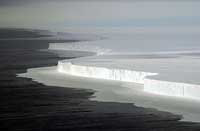World scientists meet to finish up long-awaited global warming report
Scientists from around the world gathered in Paris on Monday to finalize a long-awaited, authoritative report on climate change, expected to give a grim warning of rising temperatures and sea levels worldwide.

The Intergovernmental Panel on Climate Change is to unveil its latest assessment of the environmental threat posed by global warming on Friday.
As the panel meets, the planet is the warmest it has been in thousands of years if not more and international concern over what to do about it is at an all-time high.
"At no time in the past has there been such a global appetite" for reliable information on global warming, the panel's chairman, Rajendra Pachauri, told the conference.
Scientists are keeping quiet about the report's contents, but say it is both more specific and more sweeping than the panel's previous efforts.
Early drafts of the document give a rosier picture than that of the last report, in 2001, foreseeing smaller sea level rises than previously predicted. But many top scientists reject the new figures, saying they are not new enough: They do not include the recent melt-off of big ice sheets in two crucial locations Greenland and Antarctica.
That debate may be central at this week's meetings at the UNESCO headquarters in Paris. After four days of closed-door, word-by-word editing involving more than 500 experts, they will release the first of four major global warming reports by the IPCC expected this year.
"We're hoping that it will convince people that climate change is real and that we have a responsibility for much of it, and that we really do have to make changes in how we live," said Kenneth Denman, one of the report's authors.
The panel, created by the United Nations in 1988, releases its assessments every five or six years although scientists have been observing climate change since as far back as the 1960s.
While critics call the panel overly alarmist, it is by nature relatively cautious because it relies on input from hundreds of scientists, including skeptics and industry researchers. And its reports must be unanimous, approved by 154 governments including the United States and oil-rich countries such as Saudi Arabia, reports AP.
Pachauri said the report would make "significant advances" over the 2001 report, addressing gaps in that document, reducing uncertainties and adding new knowledge about past changes in climate.
The early versions of the new report predict that by 2100 the sea level would rise between 5 and 23 inches (12.7 and 58 centimeters). That is far lower than the 20 to 55 inches (51 to 140 centimeters) forecast by 2100 in a study published in the peer-review journal Science this month. Other climate experts, including NASA's James Hansen, predict even bigger sea level rises.
Some critics worry that the IPCC scientists did not take into account shifts in Greenland and Antarctica.
Subscribe to Pravda.Ru Telegram channel, Facebook, RSS!


